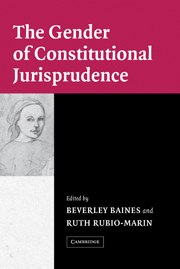Book contents
- Frontmatter
- Contents
- List of Contributors
- Acknowledgments
- The Gender of Constitutional Jurisprudence
- Introduction: Toward a Feminist Constitutional Agenda
- 1 Speaking into a Silence: Embedded Constitutionalism, the Australian Constitution, and the Rights of Women
- 2 Using the Canadian Charter of Rights and Freedoms to Constitute Women
- 3 Emancipatory Equality: Gender Jurisprudence under the Colombian Constitution
- 4 Gender Equality and International Human Rights in Costa Rican Constitutional Jurisprudence
- 5 Constituting Women: The French Ways
- 6 Gender in the German Constitution
- 7 India, Sex Equality, and Constitutional Law
- 8 Constitutional Transformation, Gender Equality, and Religious/National Conflict in Israel: Tentative Progress through the Obstacle Course
- 9 “No Nation Can Be Free When One Half of It Is Enslaved”: Constitutional Equality for Women in South Africa
- 10 Engendering the Constitution: The Spanish Experience
- 11 Gender Equality from a Constitutional Perspective: The Case of Turkey
- 12 Gender and the United States Constitution: Equal Protection, Privacy, and Federalism
- Index
- References
7 - India, Sex Equality, and Constitutional Law
Published online by Cambridge University Press: 14 January 2010
- Frontmatter
- Contents
- List of Contributors
- Acknowledgments
- The Gender of Constitutional Jurisprudence
- Introduction: Toward a Feminist Constitutional Agenda
- 1 Speaking into a Silence: Embedded Constitutionalism, the Australian Constitution, and the Rights of Women
- 2 Using the Canadian Charter of Rights and Freedoms to Constitute Women
- 3 Emancipatory Equality: Gender Jurisprudence under the Colombian Constitution
- 4 Gender Equality and International Human Rights in Costa Rican Constitutional Jurisprudence
- 5 Constituting Women: The French Ways
- 6 Gender in the German Constitution
- 7 India, Sex Equality, and Constitutional Law
- 8 Constitutional Transformation, Gender Equality, and Religious/National Conflict in Israel: Tentative Progress through the Obstacle Course
- 9 “No Nation Can Be Free When One Half of It Is Enslaved”: Constitutional Equality for Women in South Africa
- 10 Engendering the Constitution: The Spanish Experience
- 11 Gender Equality from a Constitutional Perspective: The Case of Turkey
- 12 Gender and the United States Constitution: Equal Protection, Privacy, and Federalism
- Index
- References
Summary
Whatever else Hindu society may adopt it will never give up its social structure — the enslavement of the Shudra and the enslavement of women. It is for this reason that law must come to the rescue in order that society may move on.
– B. R. Ambedkar, The Statesman, September 21, 1951An increasing number of women on the Bench will hopefully change the perception of women from being passive recipients of rights and in need of protection to being fully autonomous in their decision-making and equal participants in public life. This millenium should belong to the woman. Let us hope this great institution will take the lead in ensuring that it does.
– Indira Jaising, feminist legal scholar and Supreme Court Advocate, in a volume of essays celebrating the fiftieth anniversary of the Indian Supreme Court, 2000India's Constitution is in some ways very attuned to issues of sex equality, which were prominently debated when the Constitution was adopted in 1950. The framers of the Constitution were very conscious of deeply entrenched inequalities, both those based on caste and those based on sex, and they made their removal one of their central goals. The text of the Constitution remains in many ways exemplary in its treatment of issues of gender and sex. Traditions of interpretation have been more uneven: sex equality has enjoyed some important victories, but discriminatory perceptions of women still exercise a reactionary influence.
- Type
- Chapter
- Information
- The Gender of Constitutional Jurisprudence , pp. 174 - 204Publisher: Cambridge University PressPrint publication year: 2004
References
- 3
- Cited by



